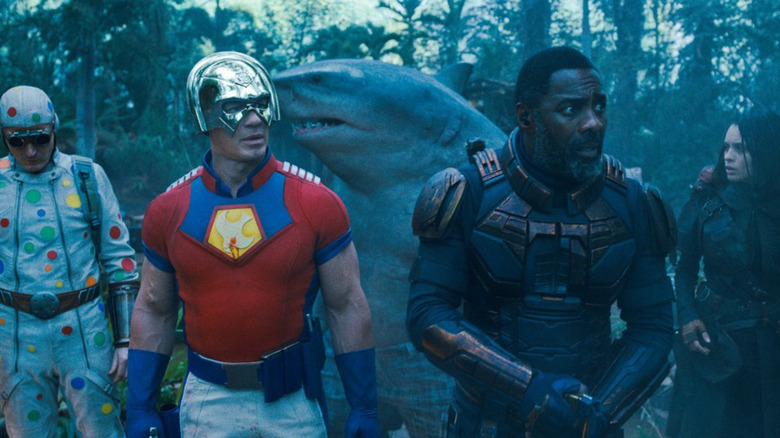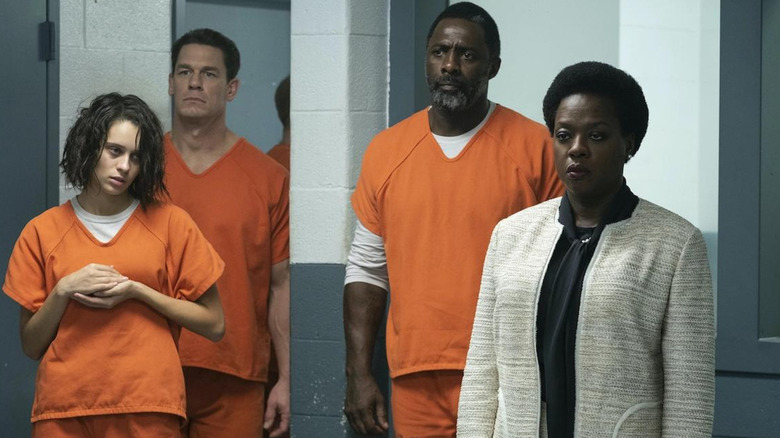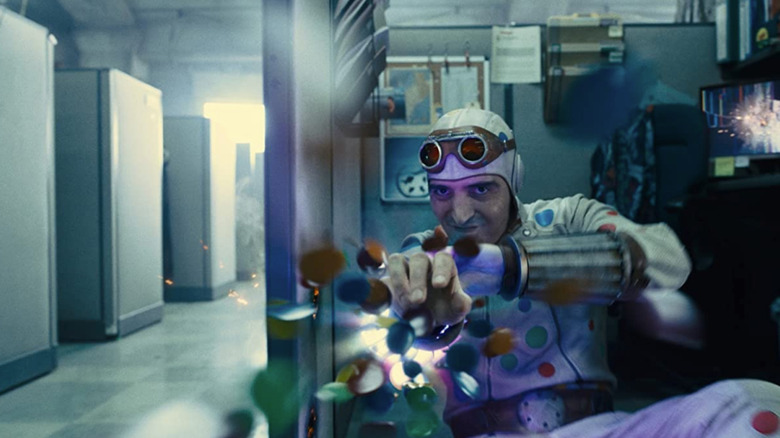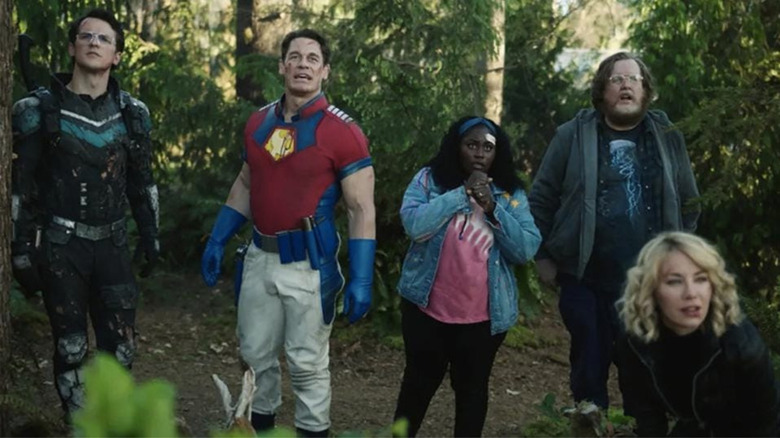James Gunn's New DC Universe Can (And Should) Reckon With The Events Of The Suicide Squad And Peacemaker
This post contains spoilers for "Peacemaker" and "The Suicide Squad."
The season 1 finale of "Peacemaker" was arguably a game-changer for the rest of the DC Universe moving forward. Even before the founding of DC Studios, the public exposure of Task Force X at the hands of Leota Adebayo (Danielle Brooks) meant that something big was about to happen. The government's most covert black ops team, one that was run by Leota's own mother, Amanda Waller (Viola Davis), is now public information. So, what lies ahead?
According to the newly-revealed DC Universe slate, that's still unknown. However, when announcing the slate yesterday during a private press event, DC Studios co-head James Gunn teased that the task force's last mission in "The Suicide Squad" could be a lingering memory. That is, until a certain Kryptonian arrives on Earth.
"Some things are like a rough memory of what happens in the DCU," said Gunn, "but once we hit Superman, anything can be changed."
What this exactly means can easily be debated and speculated on, but from the sounds of it, the reintroduction of Superman will truly set the stage for what lies ahead. But that shouldn't mean that the story threads of "The Suicide Squad" and "Peacemaker" should be wiped from existence. In fact, the universe should continue to deal with their ramifications, as they have the chance to be critical world-building assets.
A funhouse mirror of the prison industrial complex
Task Force X is a highly corrupt concept. Sure, the members of the squad are largely convicted criminals with superhuman abilities, but they're still civilians being sent to what is essentially their certain death. I understand this isn't the most groundbreaking or revolutionary of analyses -– it's probably up there with takes like "Batman beats up mentally ill people" or "Superman is an immigrant." It's something fairly obvious if you think about it for more than two minutes.
Still, acknowledging this truth does lead to why Leota's betrayal of her mother in "Peacemaker" provides a potentially critical stepping stone for the DCU. It marks a key opportunity to explore how the world at large reacts to the idea of Task Force X, of a prison program so corrupt that it sends out its own inhabitants on missions knowing fully well that they will likely die. Do the families of these prisoners get notified of their deaths? How many people have been sent to die out of Belle Reve? What other secrets is the penitentiary hiding about its conditions? These are all questions that could make for extremely interesting and prescient stories within the DCU, and they are definitely stories worth pursuing, if only for how they could mirror the real-life horrors of the American prison system.
An opportunity that shouldn't be squandered
These types of stories are just the tip of the iceberg when it comes to the possibilities of expanding the tensions introduced in "The Suicide Squad" and "Peacemaker." If you recall from "The Suicide Squad," the character of Polka-Dot Man (David Dastmalchian) revealed that he and an unnumbered amount of siblings were experimented on by their mother, resulting in some very nasty abilities. What makes this plotline so intriguing is that he mentions his mother was a scientist at S.T.A.R. Labs, a significant institution throughout the various DC timelines. This specific detail could mean that S.T.A.R. Labs may be implicated in some truly horrific crimes, blowing up the Task Force X exposure even further.
This particular storyline and character are being brought up for one key reason. Gunn had already planted the seeds for this exploration of how Task Force X's existence and fall should be reckoned with. Not using these crumbs to make a feast of sociopolitical commentary would be an opportunity wasted. Of course, we can't dictate what DC Studios should do with their projects, but we can say that systemic abuse and corruption are not mere subtext in the storyline they've created. They are just plain text, and they should continue to explore the themes they started to tell. Nobody, not even Superman, can easily wipe these ramifications away.
Looking to the future
The good news is that it seems likely that this opportunity to explore the damning effects of the Task Force X exposure won't be squandered. "Peacemaker" has already been confirmed for a second season, and the newly-announced "Waller" show will take place between the first season's finale and that forthcoming second season. That means "Waller" seems poised to take place directly after Leota's press conference exposing Task Force X and could explore how Waller navigates that little blunder. The stage is all but set, and we just have to wait and see if they actually follow through on these threads.
Further details on the upcoming DCU slate are currently being kept under wraps, including when either the second season of "Peacemaker" or "Waller" officially begins production, but we are cautiously optimistic that James Gunn won't abandon the rich themes he's built up. Comic books and their film adaptations have always been political, so why hit the breaks now?



